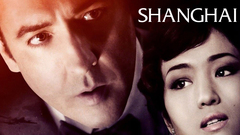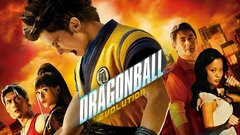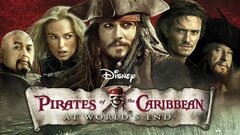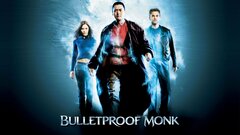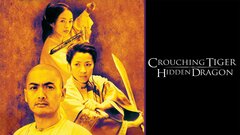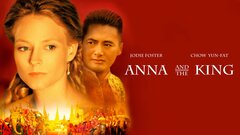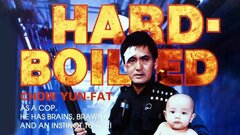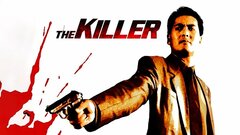Hailed by The Los Angeles Times, as quite simply, "the coolest actor in the world," Chow Yun-Fat was a fixture of Hong Kong film and TV since his debut in the early 1970s. Most celebrated by American and British cultists as a hard-boiled action hero, Chow specialized in portrayals of honorable hitmen, gangsters, thieves and trigger-happy cops. A bona fide superstar in his native Asia, Chow's extensive credits spanned a variety of genres, including romances, dramas, slapstick comedies, and supernatural thrillers.
A favorite of both common folk and cinephiles alike, Chow segued effortlessly between commercial and artsy fare. Moreover, Chow came to define "cool" with his signature handling of cigarettes and firearms with equally devastating flair. Nevertheless, Chow was at his most convincing when playing good-humored "Joes" - generally a common, blue-collar sort characterized by a sense of self-sacrifice, loyalty, and utter lack of self-consciousness.
Born in Nam Nga Island, Hong Kong, on May 18, 1955, Chow Yun-Fat escaped an impoverished rural childhood. The child of an oil rigger and his homemaker wife, Chow was one of four children who were raised in a home without electricity. As a child, young Chow would start each day by rising at 4 a.m. to sell dim sum to commuters. In 1965, Chow and his family moved to Kowloon, where he attended a Maoist School. As the Cultural Revolution raged on the mainland, the pre-teen Chow took part in the 1967 Hong Kong riots, prompting his worried mother to transfer him to a boarding school run by the Nationalist Party Kuomintang. Not finding school to his liking, Chow quit at age 17 and worked as a bellboy, postman, and camera salesman before responding to a newspaper ad for "free" acting lessons.
As it turned out, the lessons were part of a promotional gimmick sponsored by TVB - a leading Hong Kong TV operation which produced broadcasting at home and handled video distribution throughout Asia. After completing the year-long training program, Chow signed a three-year contract with the studio for a modest sum. The actor quickly became a familiar face in soaps that were exported internationally. By 1976, Chow had begun to gain worldwide notice as the young hunk on the HK primetime soap, "Hotel." That same year, he made his film-acting debut with "The Reincarnation" (1976) and had his first feature lead in "Club Girl Story" (1976). Following this success, Chow found himself in a strong position as he renegotiated his TVB contract, and stayed on for another 10 years.
In 1980, he increased his popularity with the TV drama "Shanghai Bund," as a white-suited crime boss in 1920s Shanghai. The show was a hit throughout Asia, including Shanghai itself, when Communist restrictions on imported programming were lifted in the 1990s. In fact, the episodes were subsequently re-edited into two features in 1983.
Chow continued to shift between films and TV throughout the first half of the 1980s. Most of his early features were forgettable genre entries in the world's third largest national cinema, where stars commonly appear in over half a dozen films per year. Chow scored his first critical and popular success with Ann Hui's "The Story of Woo Viet" (1981) as a Vietnamese refugee who escapes to Hong Kong. He won further acclaim and the Taiwanese Golden Horse Award for Best Actor for the period drama "Hong Kong, 1941" (1984), starring as a Northerner who comes to Hong Kong and befriends and nearly betrays a coolie. Nonetheless, after a string of commercial failures, Chow was being written off as a has-been. But then, in 1986, the actor teamed with writer-director John Woo - who was similarly undervalued in his homeland at the time - to collaborate on a film that would transform both their careers.
The result was the box-office champion, "A Better Tomorrow" (1986). A critical hit worldwide, the film instantly consolidated Chow's clout as a global headliner. "I was looking for a man who was a modern knight," recalled Woo in The Los Angeles Times in 1995 - "The kind of man with real guts, who can stand up for justice." Though Chow's character in "A Better Tomorrow" was actually a gangster by vocation, his loyalty and sense of honor more than covered the moral bill. Reputed to be the highest grossing film in Hong Kong history, "A Better Tomorrow" set the standard for HK gangster films and was a landmark in crime drama filmmaking. The movie inspired two sequels - both starring Chow: "A Better Tomorrow II" (1987) and Tsui Hark's "A Better Tomorrow III" (1990). In later years, Chow and Woo re-teamed for a string of successful projects, including "The Killer" (1989), the taut heist drama, "Once a Thief" (1991), and the influential action epic, "Hard-Boiled" (1992). Their frequent creative collaborations would eventually garner comparisons to those of Ford & Wayne and Scorsese & De Niro. Chow, in particular, seemed uniquely suited to the director's distinctive blend of over-the-top action, florid emotions, and astounding sentimentality.
Courted by Communist China to continue making films in Hong Kong when the British colony reverted to its control in 1997, Chow chose the Hollywood apparatus instead. Relocating to the U.S., Chow took some time off to master American English - with the hope of resuming his collaboration with Woo - also a recent transplant to America. Resisting studio offers to play the "gangster of Chinatown" roles, Chow remained idle for more than two years, following his last Hong Kong film, "Peace Hotel" (1995), before making his American film debut in the Woo-executive produced "The Replacement Killers" (1998). A thriller in which Chow played an assassin who teams up with a female forger (Mira Sorvino), the film was unfortunately a routine actioner that hardly was a star-making vehicle for Chow, who - clearly not yet comfortable with his adopted language - basically just mumbled his lines. While Chow fared slightly better in his next U.S. outing, "The Corruptor" (1999), co-starring Mark Wahlberg, most critics seemed to agree that the uninspiring tale was unworthy of the established Hong Kong veteran.
Breaking out of action star mode, Chow gave English-speaking audiences a crash course in his range as King Mongkut in "Anna and the King" (1999). Bringing a perfect mixture of enlightenment, compassion, and aloofness to the role, the charismatic Chow enjoyed palpable screen chemistry with two-time Oscar-winner Jodie Foster as the British governess brought to Siam to educate the royal children. Though the lush historical epic did sluggish box office stateside, it managed to take in over $120 million worldwide. His next film, Ang Lee's "Crouching Tiger, Hidden Dragon" (2000) promised to be his biggest U.S. hit to date, despite boasting an all-Asian cast speaking in Mandarin dialect. Along with Asian super-stars Michelle Yeoh and Zhang Ziyi, the film also boasted the work of acclaimed fight choreographer Yuen Wo-Ping, the man responsible for the state-of-the-art martial arts stunts in "The Matrix" (1999). A rich, complex tale of adventure and romance, "Crouching Tiger, Hidden Dragon" drew spontaneous applause from audiences at Cannes for its 20-minute-long, gravity-defying fight sequences.
His next role came in the form of a Zen-calm martial arts master whose duty is to protect a powerful ancient scroll in "Bulletproof Monk" (2003). Chow, who was joined by Seann William Scott, displayed a flurry of high-flying acrobatics and martial arts action, as Scott added much of the film's quick-wit humor. By this time, it was an undeniable fact that Chow had broken through to become a major movie star in both his home country and the United States.
After a brief hiatus from filmmaking, Chow returned the following year to resume his film career. His next three features - made expressly for the Asian market that begat him - were the 2004 indie hit "Du zi deng dai" (English title: "Waiting Alone"), the delightful romantic comedy "Yi ma de hou xian dai sheng huo" (2006) (a.k.a. "The Postmodern Life of My Aunt"), and the Academy-Award-nominated historical drama, "Man cheng jin dai huang jin jia," (a.k.a. "Curse of the Golden Flower" (2006). In 2007, Chow made a triumphant return to American screens in "Pirates of the Caribbean: At Worlds End," the second sequel to the swashbuckling 2003 original. Cast as Sao Feng, the Pirate Lord of Singapore, Chow made the most of his scene-chewing opportunity. Particularly charming in his scenes opposite Johnny Depp's Captain Jack Sparrow, Chow's presence would lend a flair of international gravitas to the proceedings.













